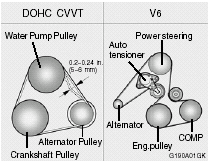Checking drive belts

Drive belts should be checked periodically for proper tension and adjusted if necessary. At the same time, belts should be examined for cracks, wear, fraying or other evidence of deterioration and replaced if necessary.
Belt routing should also be checked to be sure there is no interference between the belts and other parts of the engine. After a belt is replaced, the new belt should be adjusted again after two or three weeks to eliminate slack resulting from initial stretching after use.
See also:
Luggage compartment
LUGGAGE COMPARTMENT LIGHT (If installed)
Luggage compartment light has a 3-position
switch. The three positions are:
o In the "DOOR" position, the luggage compartment
light comes on wh ...
Catalytic Converter
Hyundai vehicle is equipped with a monolith type three-way catalytic converter
to reduce the carbon monoxide, hydrocarbons and nitrogen oxides contained in the
exhaust gas. Exhaust gases passing ...
To set cruise control speed
1. Push the cruise ON-OFF button on the steering wheel to turn the system on.
The CRUISE indicator light in the instrument cluster will illuminate.
2. Accelerate to the desired speed, which must be ...


